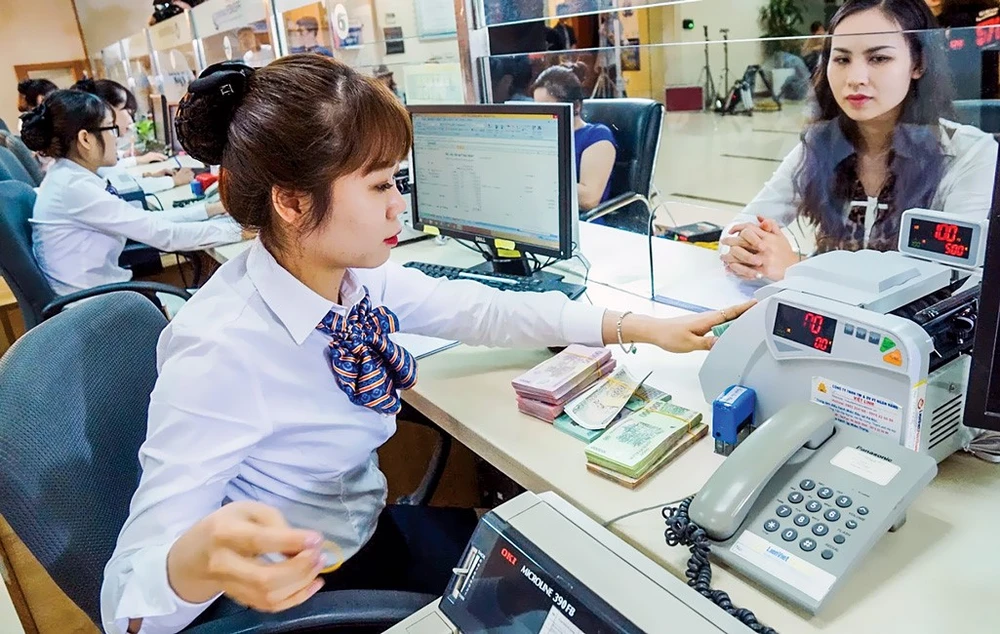
However, the Vietnamese people still indulge in their habit of using cash for purchasing, while the country’s low-network security and lack of legal regulations continue to constrain the development of digital currency even as technology is advancing globally.
Advantages of digital infrastructure
The banking industry is among the industries using new innovative and advanced technology. In the development of a digital economy, digital banking can create new services and build competitive advantages for banks.
Vietnam's push towards a non-cash payment system during the period 2016-2020 aims to bring down the ratio of cash payment to 10% by the end of 2020. This ratio in June 2019 was at 11.5%.
Currently, Vietnam's digital infrastructure related to the internet and mobile phone users is relatively well developed, with the number of internet and mobile users in 2018 reaching 55.2 million and 45.8 million respectively, taking into account 57% and 45% of the population.
In particular, the rate of smartphone users increased sharply in the past five years, reaching 84% in 2017 in the big cities. According to forecasts, the number of internet and mobile users will continue to increase and Vietnam is expected to have 60 million internet users and 55.4 million mobile phone users by 2022.
Hence, with digital payment methods showing visible signs of accelerating in recent years, a popular trend to promote the development of digital banking in Vietnam can be created. According to the State Bank of Vietnam, by the end of 2018, the inter-bank digital payment system processed 137,594 transactions, worth VND 73 million, 13 times the GDP. Thus, digital banking in Vietnam has both opportunities and challenges to thrive in the near future.
Cash using habit
Usage of banking services in Vietnam remains low compared to emerging markets. By the end of June 2018, the country had around 72.7 million individual bank accounts, with an increase of only 5% compared to the end of 2017. The number of people with accounts in banks is nearly 43.2 million, accounting for 45% of the population, a relatively low figure compared to the corresponding rate in other developing countries.
In addition, according to the World Bank, the number of ATMs and bank branches per 100,000 adults in Vietnam was at 24.3% and 3.4% respectively. This figure is lower than other countries with similar conditions.
The reason is that most Vietnamese people still have a habit of using cash in daily payments. Although, since the cashless payment method was introduced in 2016, the ratio of cash payments has been slowly declining.
According to FT Confidential research survey on payment methods when buying goods in ASEAN urban areas, more than 46% of Vietnamese use only cash. This is much higher than countries like the Philippines (at 34%) and others (at 20% or less). This makes it clear that Vietnamese are still reluctant to give up their habit of using cash, a habit they will not willing give up overnight.
Unregulated information security
Besides the cash payment method, financial information security in the digital environment also faces many difficulties when domestic information security is limited or unregulated.
According to data from Ernst & Young Vietnam, in 2018 there were 8,319 network attacks in Vietnam, and 560,000 computers affected by malware were able to steal bank account data. Vietnam ranked 7th in 2018 as the target of Trojan (Malicious Program disguised as a legitimate software).
For example, up until now, Vietnam has no legal regulations for data sharing, exploitation and storage. Banks are therefore unable to apply cloud computing or block chain to their applications liberally.
Last August, the Government approved a Scheme to promote data sharing model. This allows implementation of a new policy testing mechanism (sandbox format) for deployment and application of new technologies.
This is also a method that many countries have successfully applied in the past, which is expected to help shorten the time to study and issue new laws on digital banking, in order to keep up with the fast pace of development of technology globally.




















